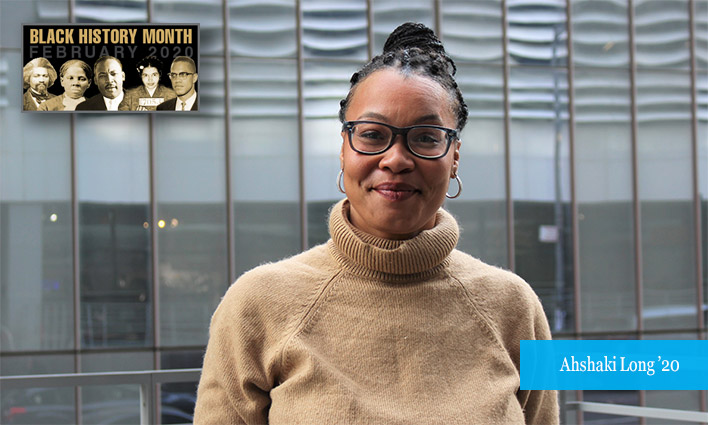
In celebration of Black History Month, our entire community is recognizing the incredible achievements and contributions African-Americans have made to this country. Aiming for a future that fully embodies the dream of Dr. Martin Luther King, Jr., we’re also applauding the work our students, faculty, staff, and alumni are doing to continue this proud legacy. The College is hosting a series of events during the month of February exploring the African-American experience, its history, and its impact on culture; including Education Emcees: Hip Hop and Community Building; AfroLatinidad; and an African-American Military Heritage Luncheon. The month-long celebration culminates with the 30th Malcolm/King Awards Breakfast on February 28, which honors the legacy of Malcolm X and Dr. Martin Luther King, Jr., and recognizes the intellect and determination of our student award winners.
In anticipation of the Malcolm/King Awards Breakfast, we spoke with this year’s award winners to understand what Black History Month means to them and to learn how they hope to advance the work of the African-American leaders that have come before them. Our first student is Ahshaki Long ’20, a Law and Society major from the Bronx, New York who has aspirations of becoming a lawyer and helping those from underserved and underrepresented communities.
“Black History Month reminds us to reflect on our own lives and examine how we’re giving back and helping our own communities.” —Ahshaki Long
February is Black History Month. What does it mean to you to celebrate the many achievements African-Americans have contributed to this country?
As an African-American, Black History Month is a month where you feel a great sense of pride and you honor those that came before you. It validates their sacrifices and efforts. And, it reminds us to reflect on our own lives and examine how we’re giving back and helping our own communities. But if I’m honest, I don’t think a month is long enough to acknowledge all the contributions African-Americans have made to this country.
If you could talk to a leader in African-American history, who would it be and what would you want to ask or say to them?
I would want to meet Muhammad Ali. I’ve always been amazed by the faith and belief he had in himself and his abilities. That kind of confidence is rare, so I would ask him how did he know he was that gifted? Where did that faith in himself come from? And how could I bring that out in myself?
What goals do you have for advancing equality and fairness for all people, especially African-Americans?
I want to be a lawyer or judge, and my hope is that as an African-American woman practicing law, I can create positive change in people’s lives. African-Americans need to diversify the bar and become lawyers and judges; we need to be there because you can’t create change unless you sit at the table. Only then will you get to the root of the problem and help others.
Where does that drive to want to help others come from?
I grew up in a poor, drug-infested neighborhood in the Bronx, New York. No one nurtured me or taught me anything, so I know what it’s like to pick yourself up and have to build yourself up. It takes so much energy, time, and effort; and because I’ve been there, I know how to help others. Since I was 18 years old, I’ve worked helping people in low-income housing, living with HIV, and struggling with mental health issues. My goal has always been to help others get the services and help they need.
What does it mean to you to receive the Malcolm/King Award?
For me, winning the Malcolm/King Award means I’m on the right path, doing what I’m supposed to be doing. I think all anyone can do is try their best, plant those seeds of goodness, and aspire to be great like Dr. King or Malcolm X. Winning the award was almost like a nod to me that I’m doing my part and I’m doing well. I’m looking forward to putting “Malcolm/King Award Winner” on my law school application.
“I want to show people living in underserved and underrepresented communities, that they can pick themselves up and create positivity in the world; and like those fighters, activists, and powerhouses that came before us, they too can inspire the world.” —Ahshaki Long
If everything goes according to plan, where do you see yourself in 10 years?
Practicing law and creating positive changes in neighborhoods. I want to create a grassroots movement, helping those that are struggling; helping people that don’t have access to programs, services, or an education. I want to show people living in underserved and underrepresented communities, that they can pick themselves up and create positivity in the world; and like those fighters, activists, and powerhouses that came before us, they too can inspire the world.



